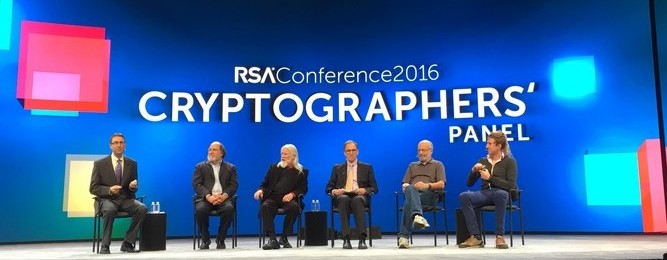A succession of keynote speakers Tuesday at the RSA Conference in San Francisco made their allegiances clear, agreeing with Apple’s perspective that developing a backdoor that would let the FBI circumvent encryption and access the phone’s contents would be akin to opening Pandora’s Box.
It’s official: The information security community is firmly behind Apple in its battle with the FBI over the fate of the infamous iPhone 5 belonging to one of the shooters in last year’s terrorist attack in San Bernardino, Calif.
None of the speakers was more straightforward than Brad Smith, president and chief legal officer for Microsoft, whose statement that the company was backing Apple drew a healthy round of applause from the thousands in attendance.
[blockquote style=”2″]When it comes to security, there is no technology that is more important than encryption,” said Smith. “The path to hell starts with the back door, and we need to ensure that encryption technology remains strong, Brad Smith, president and chief legal officer for Microsoft”[/blockquote]
RSA President Amit Yoran didn’t explicitly mention Apple, but his support of the company’s stance also was evident.
[blockquote style=”2″]Weakening encryption is solely for the ease and convenience of law enforcement,” said Yoran. “If we weaken our encryption, you can be sure the bad guys will use it against us.”[/blockquote]
Cryotographers RSANaturally, the talk of weakening encryption amounted to heresy among the members of the morning’s panel of influential cryptographers, all of whom were critical of the FBI’s request.
“Ron Rivest, an institute professor at MIT and th. I can see where the FBI is really frustrated, and I sympathize with them,” said Martin Hellman, professor emeritus of electrical engineering at Stanford and co-inventor of public key cryptography. But, he added, ” FBI Director Jim Comey is wrong.
“R” in RSA, said the biggest problem with the FBI’s request is its “breathtaking scope” that would potentially empower bureau to ask anyone, whether connected to an event or not, to cooperate with it.
What the FBI is asking really seems inappropriate,” Rivest said.
What’s especially irksome to Moxie Marlinspike, pseudonym for the founder of Open Whisper Systems, which designed the encrypted Signal mobile messaging app, is that the FBI is asking for the back door mainly so that it can be sure it hasn’t missed anything. Marlinspike is fearful of such a speculative request.
“Obliquely, they’re asking us to take steps toward a world where that’s possible,” he said. “That’s not a world I want to live in. I actually believe law enforcement should be difficult.”
Marlinspike said the FBI’s request could establish a “potentially dangerous” precedent that would, for instance, empower the FBI to ask Apple for help in the future accessing private conversations that occur in apps like Signal.
There was a glimmer of disagreement when Adi Shamir, a computer science professor at Israel’s Weizmann Institute of Science and the “S” in RSA, suggested that Apple goofed by leaving a loophole that would allow a back door into the iPhone OS. He suggested that Apple should comply with request, and then close the loophole and wait for a better test case to challenge the FBI.
Despite his centrist position, however, Shamir does believe the FBI is pushing the envelope and that Apple’s battle is a righteous one.
“The question is, where do you draw the line?” he said. “Apple is right in fighting it possibly all the way to the Supreme Court.”
That, said Microsoft’s Smith, is where the hard work has to be done—in the courts. And lest the RSA Conference audience take Microsoft’s support of Apple as an unwillingness to cooperate with the FBI carte blanche, Smith offered up a previous unshared revelation. Following the Paris attacks last year, Microsoft received 14 requests from law enforcement seeking access to data related to terrorists who were at large at the time in France and Belgium, and Microsoft validated those requests and replied to each one in an average of 30 minutes.
But he said that cases like the Apple vs. FBI flap risk the public’s trust in future technologies and the companies that create them.
“You can’t advance technology without trust,” said Smith. “The world is going to trust technology only if the law can catch up.”
The outcome of Apple’s battle with the FBI could go a long way toward helping with that process.
 Tony Kontzer
Tony Kontzer
by Tony Kontzer | RSA Conference | on March 1, 2016
Veja a cobertura completa a RSA 2016 | CryptoID
RSA 2016 |The Cryptographers’ Panel
RSA 2016 | Ghassan Dreibi fala ao CryptoID sobre a participação da CISCO no evento
RSA 2016 | CEO da Symantec Michael Brow fala sobre Segurança Holística
RSA 2016 | O que Google, Microsoft e Adobe pensam sobre privacidade?
RSAC 2016 | Keynote Speakers Talk Apple, Encryption and the FBI
































